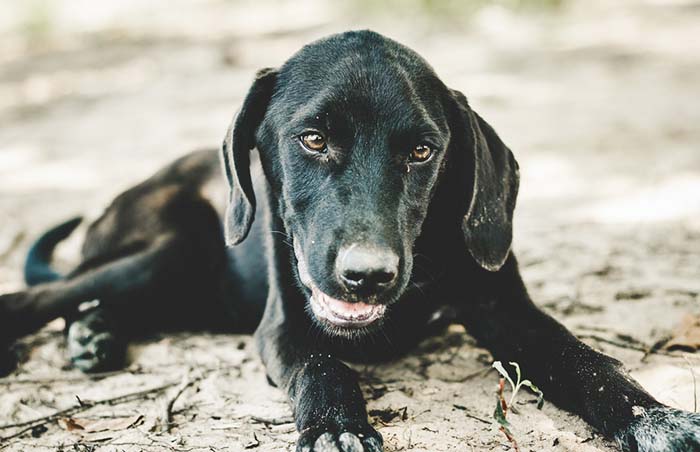You may have gotten a new puppy or adult dog, and start noticing things you didn't expect from your pooch. Did your Fido just had a hiccup? Can dogs get hiccups even? It can be surprising at first, but yes, dogs do get hiccups. Most mammals do.
 Our first response to a hiccuping dog is often to worry that he may have chewed on something he shouldn’t have and gotten something caught in the throat. While it’s good to check around, its most likely that your dog has the hiccups for the same reason people get them.
Our first response to a hiccuping dog is often to worry that he may have chewed on something he shouldn’t have and gotten something caught in the throat. While it’s good to check around, its most likely that your dog has the hiccups for the same reason people get them.
Like humans, dogs can get the hiccups and it is perfectly normal for them. All mammals that are born with a diaphragm muscle can get the hiccups (Miller, 2012). Puppies can get hiccups more often than adult dogs, and those can occur for a variety of reasons.
In this article we'll cover everything related to your dog's diaphragm muscle, do dogs get hiccups, why they get them and if there's anything you should do about it.
ALSO READ: Are Nylabones Safe for Dogs and Puppies?
Can Dogs Get Hiccups and Why?
Why Do Dogs Get Hiccups?
Your dog may have the hiccups and you are wondering what causes them. While they can be adorably cute as puppies making that “hic” sound, what is actually happening is the diaphragm, a muscle under the dog's lungs, is having a spasm (Ripley, 2017).
Your dog can get hiccups for a variety of reasons like being overly excited or tired, and eating or drinking too fast. Some of the same things that can cause you to get hiccups can cause hiccups in dogs.
Puppies tend to get the hiccups more frequently than adult dogs. This is thought to be because of their still maturing digestive system. As your dog matures, the hiccups will be less disruptive and uncomfortable for your dog because they will occur less often.
This is what a dog hiccup looks like:
Are Hiccups in Dogs Dangerous?
Your dog has been having the hiccups quite often. You have been wondering if something could be wrong with your dog. Are hiccups in dogs a reason to be concerned?
Is it possible that dog hiccups are a dangerous symptom of a more serious underlying problem? The answer is usually no. While you should consult your veterinarian if you are concerned or if the hiccups are persistent or accompanied by a cough or wheezing, most likely your dog will soon get over its spell of hiccups and be just fine.
There is no real scientific answer as to why mammals have a hiccup response. It's been theorized that this a response remaining from when we developed in utero. Hiccupping from within the womb has been found in a variety of animals, and may be a part of the early development of breathing muscles. Generally, as a puppy gets older it will tend to have less hiccups.
Reasons dogs get hiccups can range from eating too fast to gulping air with the food. There is just no clear answer. If you are worried, there are things you can try to help your dog slow down and possibly avoid getting the hiccups in the first place.
Getting Rid of Doggy Hiccups
If your dog gets the hiccups frequently or seems troubled by them, you may start to worry if something is wrong. In most cases there is nothing to be concerned about and with some rest the hiccups will clear up on their own.
Consult your veterinarian if the hiccups last more than a few hours, if your dog is having any difficulty breathing, or if you hear any type of a wheezing sound. These could be signs of a more serious health problem that will require medical care.
If the hiccups continue, you may want to attempt to try to soothe your dog or ‘cure’ it of its hiccups with some other old wives’ tale type of remedy. Some of the popular remedies that are out there include pulling on your dog’s tongue and giving it a good yank, or sneaking up and trying to scare your dog with a loud noise.
Neither of these ideas are recommended as they may cause your dog more anxiety and feelings of distrust. While your dog may be frustrated and uncomfortable there are a few things that you can do to help with your dog’s hiccups.
1. Water
When you get a drink of water it often helps with the hiccups. It works the same for your dog. It is hard to not make it worse, though. You need to calm your dog, so that it drinks the water calmly. If it gets too excited and drinks too quickly it can make it worse. The key is slow and easy.
2. Eating
Work with your dog to slow down during meals. Eating too fast can often cause the offending hiccups. If you break down the meal in to small portions, or divided bites then less air is swallowed and there is less chance for your dog to get the hiccups.
3. Breathing
The hiccups can cause your dog anxiety and stress. They may have become very excited during a time when they were already tired out, and the end result was the hiccups. Calming your dog to help attain a steady and rhythmic breathing pattern can help. Try a nice calm rub down, or dog massage to help slow the hiccups or avoid them altogether.
4. Low-Grain Foods
Many high grain foods have been shown to trigger hiccups in dogs, according to some studies (Miller, 2012). Switching to a low-grain or grain free dog food can often help but you should try a variety of foods to figure out what may be triggering your dogs’ hiccups.
5. Exercise
If your dog is having some trouble with hiccups on a regular basis, try to get him into more exercise. The idea that exercise will work in that it stimulates a change in your dog’s breathing and heart-rate. Sometimes just a change in the way your dog is breathing can cause the hiccups to subside.
Other Odd Dog Sounds
 Dog hiccups isn't the only thing pet owners may notice. Your dog can make other odd sounds that are similar to hiccups. These sounds should not make you worry in majority of cases, unless they're much too common and very consistent.
Dog hiccups isn't the only thing pet owners may notice. Your dog can make other odd sounds that are similar to hiccups. These sounds should not make you worry in majority of cases, unless they're much too common and very consistent.
When your dog has the hiccups, it may seem to choke up by take several involuntary quick breaths. These loud quick breaths are known as reverse hiccups and may be your dog’s way of clearing its sinuses (Gibbs, 2014).
Consider that there are sounds that humans, dogs, and other mammals make naturally that are just naturally occurring but may sound odd to us, like when your stomach growls loudly when you’re hungry.
There can be many surprising and involuntary sounds that your dog can make and some can be really funny. One that could catch you off guard is the ‘reverse-sneeze’ which can come as a single quick reverse snort or could be several ‘sneezes’ where your dog could seem to be snorting backwards without control with quick breaths.
All of these are involuntary actions, and are the same as if you sneezed, hiccupped, or even burped. The idea is to watch for things that seem ‘out of the norm’ or continuous behavior that seems to continue or is bothersome to your dog.
Anytime you have a concern you should consult your veterinarian, they are there to give answers, as well as to discern if anything is wrong and needs to be treated. Your veterinarian is there to guide you and having a good relationship between your veterinarian and your dog is crucial to having a long and happy life with your pet.
READ NEXT: Dog Coughing and Gagging? This Is What It Means and What You Do













